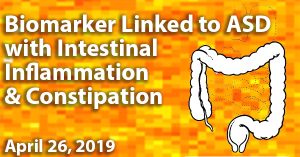Archives
April, 2019
Select a different month in the archive
Molecular Biomarker May Predict GI Symptoms in ASD
By Chelsea Toledo, M.A. on April 26, 2019

Background: For decades, researchers have suspected a link between Autism Spectrum Disorder (ASD) and gastrointestinal (GI) symptoms. The GI symptoms frequently reported in ASD include abdominal pain, constipation, chronic diarrhea, and gastroesophageal reflux disease. Some people with ASD also experience inflammation of the intestines, which respond at various rates to anti-inflammatory therapies.
What’s New: A recent study identified a biomoarker with the potential to predict which individuals with ASD and GI issues would respond quickly or more slowly to anti-inflammatory treatment. The researchers conducted molecular analyses of colon tissue samples from 35 children with ASD. Twenty of those children were found previously to respond slowly to oral anti-inflammatory medicines for GI symptoms, and 15 were fast responders.
Focusing on differences in the early stages of gene expression, the researchers found:
- Fast responders with constipation experienced timely relief after anti-inflammatory therapy, whereas constipation persisted on the right side of slow responders’ colons after treatment.
- Fast responders had greater activity of genetic material related to inflammatory and immune responses
- Slow responders had an increased number of genetic pathways related to the movement of the colon
- The presence of a single molecule could predict whether the children were slow responders to anti-inflammatory therapy.
Why it’s important: This study revealed underlying differences in genetic expression within a group of children with ASD that resulted in predictable GI outcomes. Further research may lead to specialized therapy for people with ASD and GI symptoms.
Help me understand :
| Source(s) : |
| Tweet |

